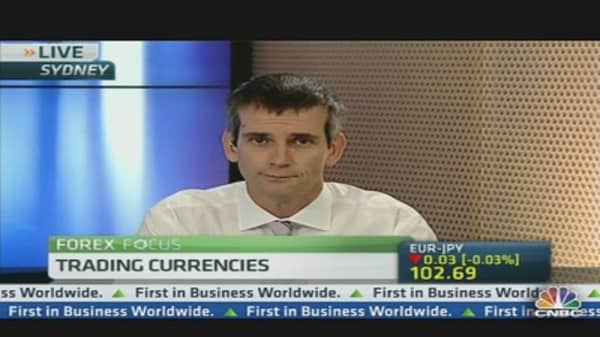There appears to be a perception in markets that once this week's key political events in the U.S. and China are over, uncertainty will be lifted and investors can get back to the 'risk on' trading environment that has prevailed in recent months. Don't bet on it, strategists say.
They point to factors such as impending U.S. spending cuts and tax hikes, referred to as the "fiscal cliff," and nagging concerns about the euro zone debt crisis as reasons not to expect a swift move back into risky assets.
U.S. voters go the polls on Tuesday, while China's ruling Communist Party will unveil a new team of leaders to rule for the next decade during a congress that starts Thursday. Let's not forget central bank meetings this week that take place in the euro zone and Britain.
(Read More: China at a Turning Point as New Leadership Takes Over)
"I don't see a swift re-entry into risk assets because there are still lots of different catalysts (for uncertainty) – once the U.S. elections are over. We have the 'fiscal cliff' and after the 'fiscal cliff,' we still have Europe," Nick Maroutsis, Managing Director at fund manager Kapstream told CNBC.
"Ultimately investors are likely to remain cautious, they will dip their toes into the markets and focus on equities in the U.S., then Asia and Europe," he added.
Aggressive monetary stimulus from central banks, including the U.S. Federal Reserve, better economic data from the U.S. and China and efforts by European policy makers to end the debt crisis in the euro zone have all boosted investor sentiment in the past four months.
Against this backdrop, U.S. stock markets have rallied about 12 percent, while European and Asian markets have notched gains of 17 percent since early June.
Risk on, Risk Off; Which?
A clear outcome to the U.S. vote and the start of the political transition in China, which have been hanging over markets for months now, are expected to give sentiment a temporary boost. Which is a signal for investors to sell, analysts say.
"If there is a clear victory for (President Barack) Obama, then there's probably going to be 'risk on' for a couple of days, maybe a week," Ron Rennie, global head of currency strategy at Westpac Bank in Sydney told CNBC Asia's "Squawk Box".
"I still think you sell into this – because we would still have the status quo –a Democrat president, a House held by the Democrats, the Congress held by the Republicans, nothing gets done. So I like selling that strength on risk," he said, referring to the fiscal cliff.
Polls show the race between Obama and Republican candidate Mitt Romney is close. A delayed result could unsettle markets in the way the protracted outcome of the 2000 election did.
"There is a risk that this election shapes up like the Bush-Gore election in 2000 when the whole process was strung out over days and weeks," Rennie said, referring to the 2000 election between Republican George W. Bush and Democrat Al Gore.
(Read More: What About an Election 'Cliff'? Here's What Could Happen)
Even if a clear election outcome boosts markets, volatility could re-assert itself heading into year-end, say analysts, adding that amid the optimism of recent months, investors have overlooked a key risk factor in the form of the U.S. 'fiscal cliff.'
The U.S. economy faces the possibility of $600 billion in automatic spending cuts and tax hikes at the start of 2013 unless Congress acts to mitigate the impact.
"Markets are a bit complacent ahead of the risks and we foresee a greater amount of volatility into November, December, into January, for as long as this issue (fiscal cliff) remains, so I wouldn't be surprised if we some moderation to the gains we've had recently," John Woods, Chief Investment Strategist at Citi Private Bank told CNBC's "The Call "on Monday.
(Read More: Romney or Obama? Here's How Asia Markets Will Vote)
Euro zone Woes
Analysts said that although concerns about the euro zone's future have ebbed, the debt crisis still lingers and that could also weigh on markets for remainder of the year.
Spain, Europe's fourth largest economy, which is suffering from high borrowing costs, looming debt repayments and record-high unemployment, is still expected to seek a financial bailout.
Greek workers meanwhile began a 48-hour strike on Tuesday in protest against the latest round of austerity cuts, which the government is trying to push through parliament to access more than 31 billion euros ($40 billion) of aid.
"Even after the (U.S.) election we could still be faced with directionless markets as we head towards the year-end. Plus there will always be an element of uncertainty as long as the euro zone crisis remains," IG Markets Strategist Justin Harper wrote in a note.
"The present catalyst for euro zone uncertainty is Greece where politicians head to parliament to vote on the latest round of austerity measures while the nation goes on strike again," he said.
- By CNBC's Dhara Ranasinghe; Follow her on Twitter: @Dhara CNBC





